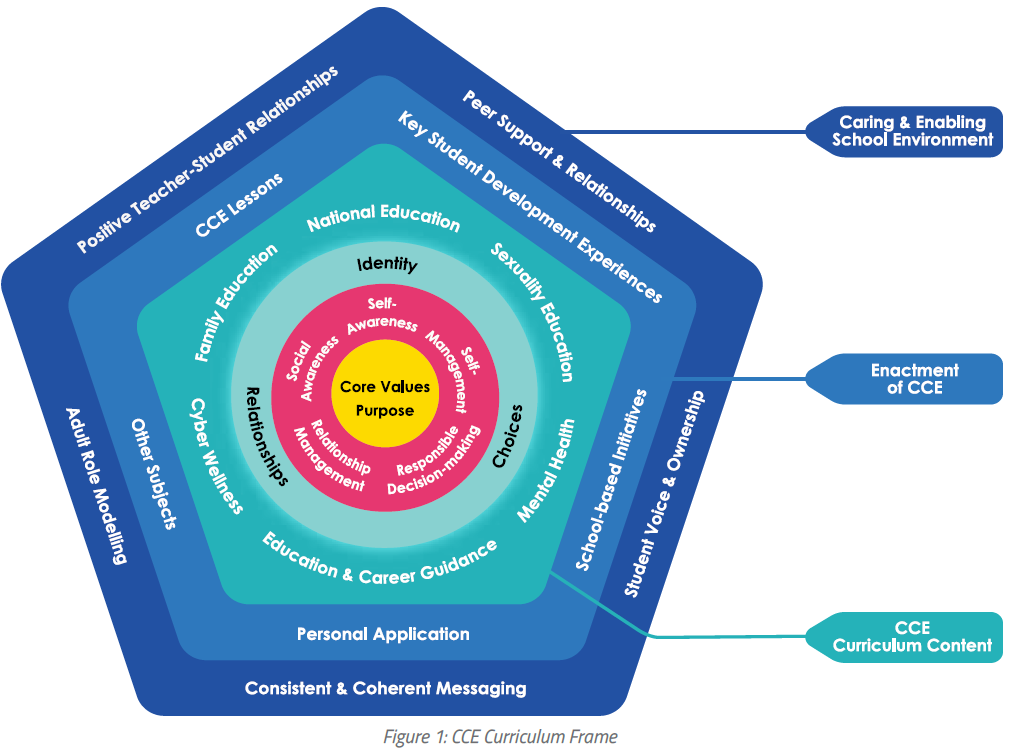Character and Citizenship Education
Character and Citizenship Education (CCE) is at the heart of education in Singapore. Through CCE, students learn values, social-emotional competencies, and develop character and citizenship dispositions that enable them to grow holistically and learn for life.
CCE Curriculum Content is based on the three big ideas of Identity, Relationships and Choices. It comprises the learning of core values, social-emotional competencies, and citizenship dispositions, with a focus on developing a sense of purpose in our students.

The values, purpose, social-emotional competencies and three big ideas of Identity, Relationships and Choice are woven across content areas of National Education (NE), Sexuality Education (SEd), Mental Health (MH), Education and Career Guidance (ECG), Cyber Wellness (CW), and Family Education (FE), in ways that are age-appropriate and meaningful for our students.
National Education
National Education (NE) was launched in 1997. It aims to provide our students with the knowledge, skills, and values to understand Singapore’s history and unique geo-political context, appreciate our journey to nationhood, cultivate the instincts for survival as a nation, and have confidence in our nation’s future.
NE provides opportunities for our students to explore and examine their identity as Singaporeans and arrive at a common set of ideals and values. The following key dispositions for citizenship in Singapore shape the purpose and approach to NE:
-
A Sense of Belonging: to develop a deeper understanding of who we are as Singaporeans, and a shared understanding of the values that are important to us as a nation.
-
A Sense of Reality: to be aware of contemporary realities — including Singapore’s constraints and vulnerabilities — which affect us as a nation amidst the backdrop of a less predictable world.
-
A Sense of Hope: to have confidence and optimism in Singapore’s future and the resilience to face the challenges ahead.
-
The Will to Act: to be active citizens who have a collective resolve and a sense of shared mission towards building a Singapore for all.
Sexuality Education
Our youths are growing up in a different world today. Globalisation and technological advancements like the Internet and social media have exposed our young to a wide range of influences from around the world that could endanger health and undermine the integrity of the family.
Sexuality Education aims to help students:
-
Make wise, responsible, and informed decisions through the provision of accurate, current, and age-appropriate knowledge on human sexuality and the consequences of sexual activity.
-
Know themselves and build healthy and rewarding relationships through the acquisition of social-emotional competencies of self-awareness, management of their thoughts, feelings, and behaviours, development of empathy for others, possession of effective communication, problem-solving, and decision-making skills.
-
Develop a moral compass, respect for themselves and for others as sexual beings, premised on the heterosexual married couple forming a nuclear family as the basic unit of society, through the inculcation of positive mainstream values and attitudes about sexuality.
More information can be found here.
Mental Health
Mental well-being is key to overall health and development. To strengthen students’ mental well-being, we need to equip them to manage their thoughts, feelings and behaviours to effectively cope with life’s stresses, relate well to others, develop a sense of meaning and purpose in life, as well as contribute to the community.
Having a healthy and balanced lifestyle, such as having a healthy diet, exercising regularly, having sufficient sleep and managing screen time, also contributes to positive mental well-being.
Education and Career Guidance
Education and Career Guidance (ECG) is about equipping students with the necessary knowledge, skills, and values to make informed decisions at each key education stage for successful transition from school to further education or work, so that they can manage their education and career pathways and practise lifelong learning throughout their lives.
ECG aims to:
-
nurture student’s self-awareness and self-directedness for lifelong learning;
-
enable students to explore education and career options, by equipping them with accurate and comprehensive information;
-
help students develop a growth mindset and a resilient attitude to embrace future opportunities, and appreciate all occupations across society; and
-
create opportunities for students to build positive connections with the community (such as teachers, ECG counsellors, parents, industry partners), to develop an appreciation for different career pathways.
Cyber Wellness
Social networking sites, online games, videosharing sites and devices such as mobile phones and tablets are now common fixtures in our students’ lives. In Singapore, by the age of fifteen, most youths are connected online via their smart phones. The digital lifestyle and the evolving nature of social media have also given rise to a set of emerging and complex issues such as:
-
online sexual grooming;
-
instant gratification;
-
deliberate online falsehoods; and
-
the loss of opportunities to build deep connections with peers, resulting in feelings of isolation. All of these can have an adverse impact on our students’ well-being.
Through CW education in CCE, students learn to be respectful, safe, and responsible users of technology and be a positive peer influence, advocating for the good of the community online.
Family Education
The family provides the first experience of love, care, and emotional support. A well-functioning family built on loving and healthy relationships is an anchor for the growth and development of the child. The family is also the key influencer in helping our children make sense of their experiences in life.
Family Education will focus on the teaching and learning of skills to strengthen relationships. This will nurture confidence and seed positive experiences for a longer-term perspective of the value of families. Crucial for individual well-being, strong and stable families provide the foundation for the building of communities and for developing the resilience of our people for the flourishing of the nation.

